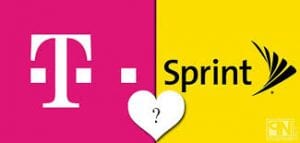How Was Your Weekend?
While four NBA teams did battle this Sunday to advance in decisive playoff games, and a climactic episode of Homeland marked the series’ season finale on cable TV, two other high-flying performers on the global stage, T-Mobile and Sprint, decided to join forces, shaking hands on a $26.5 billion merger proposal that would reduce the U.S. wireless industry to three major players.
The “art” of this deal will only pass muster if the Trump administration’s antitrust regulators let the ball sail through the net of the U.S. homeland. When AT&T and Sprint attempted a similar play, the outside shot was blocked by the Obama administration.
Seattle-headquartered T-Mobile and Kansas-based Sprint, the nation’s third- and fourth-largest wireless companies, have contemplated a merger for years. Now, just as the Trump administration has filed a lawsuit to interrupt an AT&T-Time Warner joining, another engagement overture has emerged.
The newly combined entity, which proposes to retain the name T-Mobile, would combine about 127 million customers. Consumer advocates are concerned that a less competitive telecom field will result in higher prices, while unions are concerned about potential job losses.
In a conference call, Sprint CEO Marcelo Claure acknowledged that getting regulatory approval is “the elephant in the room.” One of the first things the companies did after sending out the deal’s news release was to call Ajit Pai, chairman of the Federal Communications Commission.
The companies claim that they would intend to do more hiring in rural areas, than they do right now. They also state that their merger would help accelerate development of faster 5G wireless networks and ensure that the U.S. doesn’t call behind China in technical leadership.
But mostly, the sentiment is that a morphing of T-Mobile-Sprint would allow the new entity to better compete with AT&T and Verizon as well as with Comcast and others as the wireless, broadband and video industries converge.
“This isn’t a case of going from 4 to 3 wireless companies — there are now at least 7 or 8 big competitors in this converging market,” T-Mobile chief executive John Legere said in a statement. Legere, the iconoclastic CEO with a penchant for publicity and promotion, would be the CEO of the combined company.
Seattllites know T-Moble not only for its local presence at headquarters in the Factoria section of Bellevue, but for its historic advertising campaigns run out of the Publicis agency on Queen Anne and featuring, over the years, Catherine Zeta Jones, among others.
The ownership groups are both foreign-based. Deutsche Telekom, T-Mobile’s parent, would own about 42 percent of the combined company. Japan’s SoftBank, which controls Sprint, would own 27 percent, and the remainder would be held by the public. The deal is subject to review by the Justice Department and the FCC.
The companies speculate that a green light would have the deal closing by the first half of 2019 and would result in about $6 billion in annual cost
Do the numbers make sense? Sprint has posted a string of annual losses and carries a lot of debt while T-Mobile has been on a streak of adding customers. After the government nixed AT&T’s attempt to buy Sprint in 2011, T-Mobile led the way in many consumer-friendly changes, such as ditching two-year contracts and bringing back unlimited data plans.
Consumers are paying less for cellphone service thanks to T-Mobile’s influence on the industry and the resulting price wars. Verizon and AT&T have been expanding their video-content businesses, while cable companies have been moving into wireless. Tomorrow’s forecast is anything but clear.





















